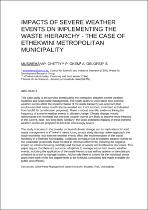 ResearchSpace
ResearchSpace
Impacts of severe weather events on implementing the waste hierarchy - the case of Ethekwini metropolitan municipality
JavaScript is disabled for your browser. Some features of this site may not work without it.
- ResearchSpace
- →
- Research Publications/Outputs
- →
- Conference Publications
- →
- View Item
| dc.contributor.author |
Muswema, Aubrey P

|
|
| dc.contributor.author |
Chetty, P

|
|
| dc.contributor.author |
Okem, P

|
|
| dc.contributor.author |
Oelofse, Suzanna HH

|
|
| dc.date.accessioned | 2018-10-31T05:47:51Z | |
| dc.date.available | 2018-10-31T05:47:51Z | |
| dc.date.issued | 2018-10 | |
| dc.identifier.citation | Muswema, A.P. et al. 2018. Impacts of severe weather events on implementing the waste hierarchy - the case of Ethekwini metropolitan municipality. The 24th WasteCon Conference and Exhibition, 15-19th October 2018, Emperors Palace, Johannesburg, Gauteng | en_US |
| dc.identifier.uri | http://hdl.handle.net/10204/10509 | |
| dc.description | Paper presented at the 24th WasteCon Conference and Exhibition, 15-19th October 2018, Emperors Palace, Johannesburg, Gauteng | en_US |
| dc.description.abstract | This case study is an overview investigating the interaction between severe weather incidents and solid waste management. The study seeks to understand how extreme weather events affect the implementation of the waste hierarchy (an approach that emphasises that waste must firstly be avoided and if not avoided, minimised and diverted from landfill for beneficiation purposes). There is robust scientific evidence linking the frequency of extreme weather events to climate change. Climate change models demonstrate the likelihood that extreme weather events are likely to become more frequent in the current, near- and long-term. Similarly, the socio-economic impacts of these extreme weather events are projected to become increasingly severe. The study is located in the broader context of climate change and its implications for solid waste management in eThekwini metro. Using a case study desktop review approach, the study examines how extreme weather events affect the implementation of the waste hierarchy in eThekwini Municipality. Additional consequences to extreme weather events for the vulnerable (especially those located in informal settlements) including the negative impact on informal housing, mortality and the loss of assets and livelihood is discussed. This paper argues that there are a number of options to manage waste from severe weather events, including the application of the waste hierarchy (as well as options to stimulate job creation) as a tool to manage wastes. Additionally there is a need for the individual sector plans from each of the line departments to be finalised, completed and made available (to public and officials). | en_US |
| dc.language.iso | en | en_US |
| dc.relation.ispartofseries | Worklist;21288 | |
| dc.subject | Solid waste management | en_US |
| dc.subject | Waste hierarchy | en_US |
| dc.subject | Disaster | en_US |
| dc.subject | Risk | en_US |
| dc.subject | Vulnerability | en_US |
| dc.title | Impacts of severe weather events on implementing the waste hierarchy - the case of Ethekwini metropolitan municipality | en_US |
| dc.type | Conference Presentation | en_US |
| dc.identifier.apacitation | Muswema, A. P., Chetty, P., Okem, P., & Oelofse, S. H. (2018). Impacts of severe weather events on implementing the waste hierarchy - the case of Ethekwini metropolitan municipality. http://hdl.handle.net/10204/10509 | en_ZA |
| dc.identifier.chicagocitation | Muswema, Aubrey P, P Chetty, P Okem, and Suzanna HH Oelofse. "Impacts of severe weather events on implementing the waste hierarchy - the case of Ethekwini metropolitan municipality." (2018): http://hdl.handle.net/10204/10509 | en_ZA |
| dc.identifier.vancouvercitation | Muswema AP, Chetty P, Okem P, Oelofse SH, Impacts of severe weather events on implementing the waste hierarchy - the case of Ethekwini metropolitan municipality; 2018. http://hdl.handle.net/10204/10509 . | en_ZA |
| dc.identifier.ris | TY - Conference Presentation AU - Muswema, Aubrey P AU - Chetty, P AU - Okem, P AU - Oelofse, Suzanna HH AB - This case study is an overview investigating the interaction between severe weather incidents and solid waste management. The study seeks to understand how extreme weather events affect the implementation of the waste hierarchy (an approach that emphasises that waste must firstly be avoided and if not avoided, minimised and diverted from landfill for beneficiation purposes). There is robust scientific evidence linking the frequency of extreme weather events to climate change. Climate change models demonstrate the likelihood that extreme weather events are likely to become more frequent in the current, near- and long-term. Similarly, the socio-economic impacts of these extreme weather events are projected to become increasingly severe. The study is located in the broader context of climate change and its implications for solid waste management in eThekwini metro. Using a case study desktop review approach, the study examines how extreme weather events affect the implementation of the waste hierarchy in eThekwini Municipality. Additional consequences to extreme weather events for the vulnerable (especially those located in informal settlements) including the negative impact on informal housing, mortality and the loss of assets and livelihood is discussed. This paper argues that there are a number of options to manage waste from severe weather events, including the application of the waste hierarchy (as well as options to stimulate job creation) as a tool to manage wastes. Additionally there is a need for the individual sector plans from each of the line departments to be finalised, completed and made available (to public and officials). DA - 2018-10 DB - ResearchSpace DP - CSIR KW - Solid waste management KW - Waste hierarchy KW - Disaster KW - Risk KW - Vulnerability LK - https://researchspace.csir.co.za PY - 2018 T1 - Impacts of severe weather events on implementing the waste hierarchy - the case of Ethekwini metropolitan municipality TI - Impacts of severe weather events on implementing the waste hierarchy - the case of Ethekwini metropolitan municipality UR - http://hdl.handle.net/10204/10509 ER - | en_ZA |





